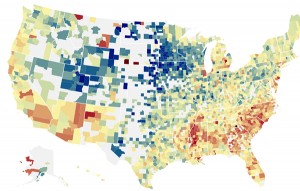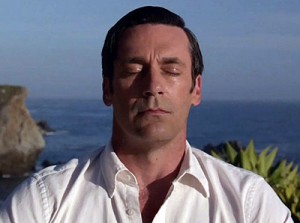They’re such a big target – and everyone who reads them knows how easy it is hit the logical lunacy of columns by Tom Friedman, David Brooks, and Maureen Dowd, among others. But this New York Times interactive feature on the best and worst places to grow up also leaves a bit to be desired.

I don’t think its fact are wrong, per se; indeed they quite accurate, I’m sure. It’s just that there is far more to the story, which assumes that everyone is only living to earn as much as possible. Certainly, many people are. But do we have to cater every possible thought and thought process toward them? What if you are living to become the best person you can? Or to help make your community a vibrant, welcoming place? To use less energy? To achieve some kind of work-life-family balance? There are a whole host of reasons to live any place, and they can’t be completely disentangled.
Also, for counties where there is extremely bad income mobility for children in poor families, the accompanying text boldly suggests that families should move to a better, adjoining county. There are so many reasons that this would be a terrible idea in many cases that it undermines that case for the entire (and exhaustively robust) info graphic in the first place. That’s the take away? To move? What about the other factors that would surely follow? Besides the obvious impossibilities that would come into play for most people – this is akin to advice that, if your job doesn’t pay well enough, just get another, better paying job – the array of other impacts, less diversity, no public transportation, less nightlife and restaurants, driving (if applicable) back from the terrible place you lived where there was more going on after a few drinks to your Shangra-la out in the (gated, even) sticks, more TV watching, fewer neighbors… the whole thing becomes absurd when imagined within these all-too-likely outcomes.
It is great to acknowledge (and visualize) societal problems. But let’s don’t get too secure in the availability of easy answers.
 It’s been a strange week, in a very good way.
It’s been a strange week, in a very good way.

 Like corporate green advertising, our policies against the poor get lost in a shuffle of righteous sounding reforms, intended to move people from “welfare to work” in order to usher in a new era of “personal responsibility.” The two strategies have much in common as we whitewash our consciences with high morals and the appearance of genuine, public-spirited problem solving. But there’s a dark side to this shell game every bit as dastardly as Exxon-Mobile working to build your energy future: Where do the poor go once they leave a statistical column?
Like corporate green advertising, our policies against the poor get lost in a shuffle of righteous sounding reforms, intended to move people from “welfare to work” in order to usher in a new era of “personal responsibility.” The two strategies have much in common as we whitewash our consciences with high morals and the appearance of genuine, public-spirited problem solving. But there’s a dark side to this shell game every bit as dastardly as Exxon-Mobile working to build your energy future: Where do the poor go once they leave a statistical column?



